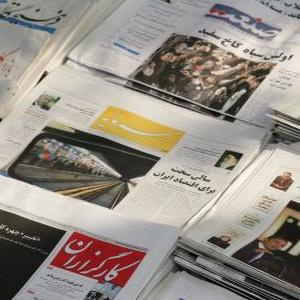Tehran's Daily Newspaper Review

Iran daily’s special edition on hejab, titled “Khatoon”, continues to provoke the protest of Principlists and religious figures, including Ayatollah Makarem Shirazi. The vocal marja’ slammed the newspaper for publishing material which on the one hand criticized the police forces for the moral patrol and on the other hand, promotes women’s sports. The Ayatollah also stated that such material are published to gain electoral votes, criticizing it with the sharpest words heard from him during the recent years.
Iran interviewed another group of “experts” to defend itself against reactions to Khatoun special edition. “Do not politicize people’s religious beliefs” the newspaper chose as its banner headline. Iran held a panel on the developments in Syria to discuss “the mystery of five-month unrest in Syria”. Ali-Akbar Javanfekr also defended Iran's Saturday special edition on hejab, bashing the Principlist media for their “disgusting measure” in “creating a propaganda wave based on manipulation, lying and subverting the reality.” He expressed his readiness to attend the court, after Tehran Prosecutor’s indictment, although he believed that the attorney’s decision was under the influence of the smear campaign.
Jomhouri-ye Eslami reported gradual approach of Qaddafi’s opponents towards Tripoli, while quoting the Libyan Revolutionary Council’s envoy to Tehran that Imam Musa Sadr, legendary Shi’a leader whose fate has been unknown since his 1978 to Libya, has been killed in Qaddafi’s prison. Majles’ opposition to government’s suggestion for adding a day to Eid-e Fetr holidays (marking the end of Ramadan) and Mubarak’s trial were other headlines placed on the front page of the newspaper. The electoral debates between presidential nominees are an opportunity to disclose the true face of American politicians, Jomhouri-ye Eslami argued, taking quotations from Ron Paul, Rick Santorum and Michele Bachmann which called for realism in dealing with Iran and downplaying what US views as the threat of Iran's nuclear program.
Kayhan’s top headline was Spiegel’s report on “Europe’s dread about the spread of Britain’s riots.” It also covered the “intensifying crisis” in Israel. The newspaper’s reaction to Iran's special edition was predictably harsh, calling the Astray Current, assumed to be the mastermind behind Khatoon, “rented footman of foreign intelligence services”. Hossein Shari’atmadari also called Esfandiar Rahim Mashaei a “stopgap footman” in the newspaper’s editorial, suggesting that Khatoon has been published to divert attention from bigger events happening, such as confessions made by arrested members of the current, a mission dictated by the US to tarnish the Islamic Republic model for the region or to take focus away from the plight of the British government.
Resalat’s top headline was Ahmadinejad's remark in the inauguration ceremony of the minister of the newly formed Cooperatives, Labor and Social Affairs Ministry in which he stated that “the unemployment rate should fall down to zero” in Iran. The newspaper also quoted Chairman of the Foreign Affairs Committee of Majles, Allaeddin Boroujerdi who called the situation in Britain “a concrete manifestation of human rights’ violation”. In Resalat’s editorial, Kazem Anbarlouyi elaborated on the plights of West and the challenge it’s facing in Middle East to attract attention to the golden opportunity provided for Iran to achieve the “sublime causes of the Islamic Republic”.
Shargh’s also maneuvered on the Khatoon story, with a focus on MPs’ reaction. The newspaper also reported that since Saturday night, special units of the police forces have been deployed around Iran daily’s office upon demand of government officials. The newspaper also published Mahdi Kalhor –Ahmadinejad's advisor- and Ali-Akbar Javanfekr, two officials whose remarks in the special edition made the most controversy. Michele Bachmann’s glow in Fox News debate and police forces’ satellite dishes’ dismantling operation also appeared on the front page of Shargh. The newspaper’s op-ed, written by Kazem Akrami, former Minister of Education, called for more consideration in implementing the new ‘Islamic’ curricula in schools.
Tehran-e Emrooz also covered “Majles’ strong reaction to the government’s mouthpiece’s controversial special edition”. The newspaper reported that the parliament intends to summon the Minister of Culture to question him about the controversial content of Khatoon. Tehran-e Emrooz also quoted Morteza Talaei, member of Tehran City Council and Qalibaf’s confidante, who asked Principlists not to ask for a bigger share of the Principlist electoral slate. The newspaper’s editorial called for Principlists to put aside differences and gather under the auspices of Ayatollah Mahdavi Kani and the jame’atein.
“Facebook and Twitter against the British underprivileged” was Vatan-e Emrooz’s top headline, complemented by a lengthy report on the British government’s violation of civil and human rights in cracking down on protestors. Second session of Mubarak’s trial and the parliament’s warning to pro-Britain media (i.e. Reformist media who showed support for David Cameron’s treatment of the riots) also attracted Vatan-e Emrooz’ attention.
* Note: Vatan-e Emrooz does not publish on Thursdays.
Trouble with understanding some terms? Check our Glossary of Iranian Political Terms.
Briefing
Hamshahri (Citizen) is the official daily newspaper of Tehran's Municipality. Its general directions in politics, culture and economy are determined by the mayor of Tehran, currently Mohammad Baqer Qalibaf.
Iran is the official organ of the administration.
Jomhouri-ye Eslami (The Islamic Republic) was known as the official organ of the Party of the Islamic Republic, founded in 1979 and disbanded in 1987. Currently, it is an open critique of Mahmoud Ahmadinejad's policies and is known to be a mouthpiece of Akbar Hashemi Rafsanjani.
Kayhan (Universe) is a hard-line conservative newspaper. Its editor-in-chief –currently Hossein Shari’atmadari- is appointed by Iran's Supreme Leader. Shari’atmadari’s editorials often spark off controversy and debate inside Iranian political circles.
Khabar (News) is a principlist daily newspaper which adopts a critical stance towards Ahmadinejad's policies.
Resalat (Mission) belongs to the moderate wing of the principlist camp. Resalat’s best known analyst is Amir Mohebbian, its political editor.
Shargh (East) is a moderate reformist newspaper. It was the most popular and influential reformist newspaper in its first period of publication which lasted from August 2003 until September 2006.
Tehran-e Emrooz (Tehran Today) is a ‘principlist reformist’ newspaper, connected to Mohammad Baqer Qalibaf.

